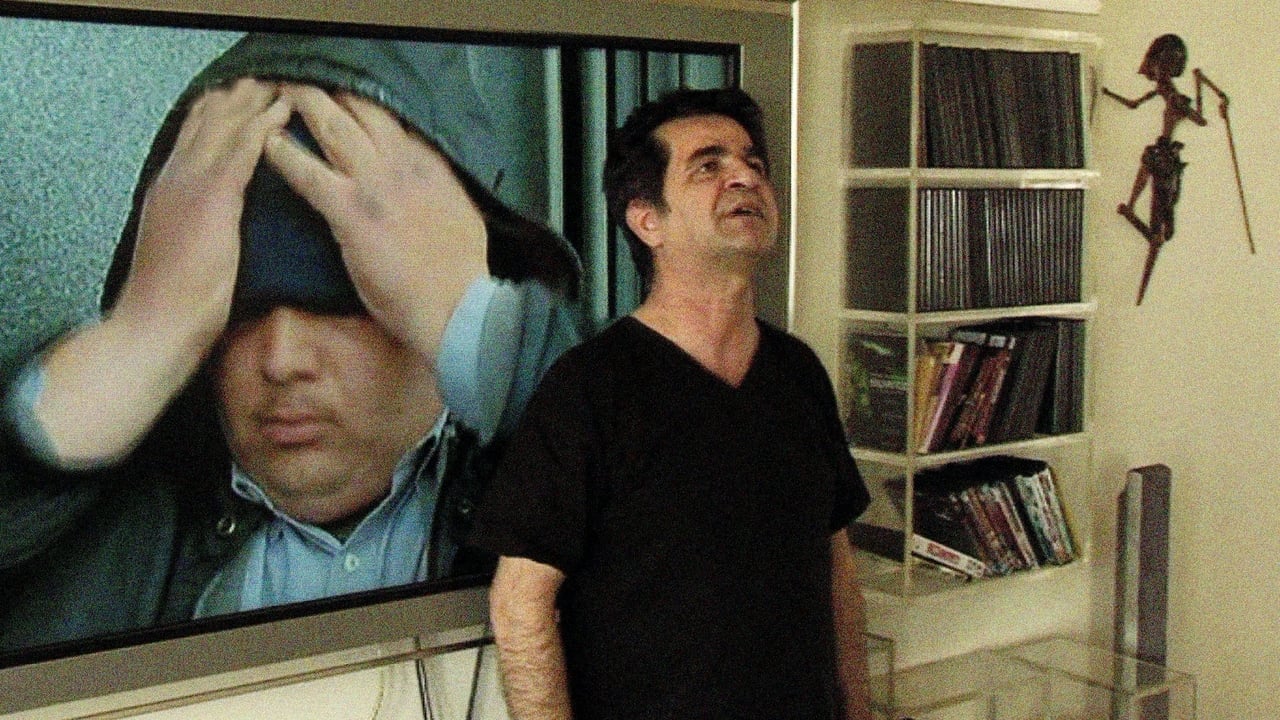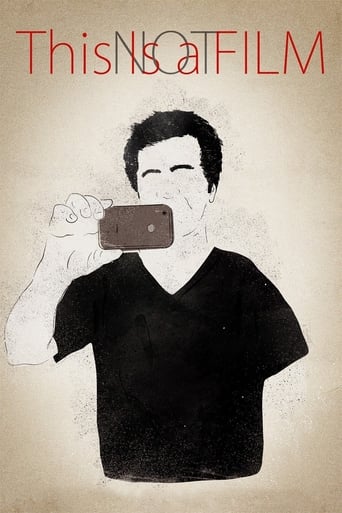

There are not many viewers who are aware of philosophy and its paradoxes. Liar's paradox is one of the most famous philosophical puzzles which continues to mock human beings. Its beauty lie in deciphering the phrase "This sentence is false."Anybody who tries to interpret it encounters a cumbersome dilemma as both options do not seem to be effective. Let us discuss something about a film. Most of us know well what a film is and what it is supposed to be. However, we are doomed if we are asked to describe what a film is not ? The whole idea of a film not being a film is absolutely ridiculous rather preposterous as a film can only be a film and nothing else. A film cannot be an actor, a cinema hall, a reel, a typewriter or a mobile phone. For a film to be a film, to be called a film, to be classified as a film, it has to be a film first and then it can be anything else. This is the most elementary thing one can say about a film's ontology. A film with a weird title like "This is not a film" makes mockery of cinema as a medium of artistic expression. Jafar Panahi has made better films but he has put his entire oeuvre to shame by making what many of us would like to call a "very bad film". It is an insipid exercise in arrogance, idiocy, show-off and vanity as Jafar Panahi is shown how important and influential he is as he makes phone calls to his contacts, whiles away his time by playing with a pet iguana and does other minor tasks at home. One knows well that television is often derided as being a stupid means of entertainment. However, "This is not a film" emerges as even worse than a work of television as it does not have any basic entertainment value. This film is scandalous as it doesn't carry any 'artistic message'. It is merely a pseudo exercise in garnering sympathy for a director who has chosen to call his film as 'it is not a film'.
... View MoreThis film was roundly praised by the filmmaking community and stories of it being smuggled out of Iran in a cake certainly helped to raise awareness of the fate of Jafar Panahi. Unlike some, I shall not pretend to be knowledgeable enough to have heard of him before this film, nor to be a fan of his work (!) as others were keen to point out – for me this was a learning experience as I never heard of him. As such the film was interesting in how it informed me about the situation and the bigger picture. However it did this by simply existing – before I'd even watched a second of it, so what would the actual film bring to the table?Well, the main thing is to illustrate the restraint of creativity by having Panahi "story-board" some of his existing script and also talk about some moments from his previous films. These moments are pretty engaging because he has a passion and he has a vision that comes over in these scenes. Other scenes add to his story and add value in this way, however too much of the film just illustrates his time in his house – and his time stuck in the house is dull; dull for him and dull for us. In a way it is good to share this, but it doesn't engage the audience and by shooting whatever is said or happens, then it feels like there is no goal or structure to the film.I can understand the logic and, as others have said, this is non-violent protest; Panahi has the chance to violently lash out with either direct verbal attacks or with snipe commentary and presentation, but he doesn't do this – instead he peacefully sits down in front of the camera and makes this non-film as a peaceful protest against the situation, not hurting anyone. However this passive approach doesn't engage and it is increasingly dull as it has less and less to say. I know the film was beloved of festivals and lovers of cinema and I would love to claim beauty and emotion and be able to present myself a certain way, but this was not the case for me. The value in the film is not enough for the length and I was bored of it outside of the few sections I describe. I am very glad the film exists – very glad indeed, but watching it is a very different matter.
... View MoreThis Is Not A Film comes to audiences already with a high level of notoriety. The famous film behind "cakegate", it's constricted production meant that the film was distributed out of Iran on a USB stick concealed inside a birthday cake. It's the kind of screwball scenario you might find on a Judd Apatow movie, but This Is Not A Film is no laughing matter. As the title would assume, this is not so much of a film as it is a film exorcism.Whilst under house arrest, and pursuing an appeal against a six year prison sentence and 20 year ban from directing, esteemed Iranian auteur Jafar Panahi (The Mirror, Crimson Gold) invites fellow filmmaker Mojtaba Mirtahmasb into his home to crudely document a day in his tormented life.Shot on a digicam and later an iPhone, we follow Panahi shuffling around his apartment, feeding his daughter's pet iguana, paying the delivery boy for takeaway food, and calling his tenacious attorney trying to get him out of house arrest. At first, it's a minor study of segregation and loneliness, but This Is Not a Film is at it's most enthralling when Panahi expresses his natural directing flare; acting out his latest screenplay from the (dis)comfort of his family living room, discussing camera angles to the most minute detail, and reflecting on how he managed to reach such a raw level of intimacy in his previous works. Whether you are aware of his filmography or not, it's clear that Panahi is an exuberant cinephile, which makes his current, and ongoing battles with the government even more distressing.If you were forced to judge this meta-commentary diatribe, one could suggest that Panahi and Mirtahmasb fail to present a bigger picture on the crisis of the state's dominance over artistic intent. Similarly to 2006′s female equality drama Offside, This is Not a Film is incredibly subtle with it's political allegories, bordering on the coyly parabolic. Instead of presenting a bigger, ultimately more controversial picture on the crisis of state dominance in the creative industries, Panahi and Mirtahmasb reach a palpable level of verisimilitude in the very smallness of the situation. It all comes together in a final twenty minute sequence where Panahi falls behind the camera and back into storyteller mode (it could cost him his life, but he can't help it). He follows a young dustman around the apartment block and asking him what his plans for the future will be. The cordial apprentice is unsure, but it's hopefully going to be a life less frightening than the one Panahi has been dealt.This Is Not A Film concludes with harrowing sentiment. With the sound of New Years' Eve fireworks and cheering in the background, the screen fades to black, with the credits and special thanks nods are left blank, followed by a final frame that sets out a humble dedication to all Iranian filmmakers. It may be a non-film but, whatever it is, it's certainly a riveting watch; and has rightly earned a place in the Oscars' documentary award shortlist.Here in the Western world, our access to information, democratic governments and human rights mean that cinema is taken for granted, and filmmakers have it easy. Whilst we bemoan the extortionate prices of popcorn, Panahi and Mirtahmasb are putting their lives on the line to tell the stories they feel they must tell, in the hope that, one day, their nation will be able to have the same sort of pro-democratic freedom as the rest of us.www.366movies.com
... View MoreHidden inside a birthday cake and smuggled out of the country, the 75-minute "effort", This is Not a Film, tells us all we need to know about the cruelty of the Iranian dictatorship and the courage of film director Jafar Panahi. Panahi, who has given the world such masterpieces as The White Balloon, The Circle, and Crimson Gold was arrested in March, 2010 and faces a ban of twenty years from making films and a six-year prison sentence for "propaganda against the Islamic Republic." This refers to exercising free speech by speaking out against the rigged elected of Iranian President Mahmoud Ahmadinejad.As part of his sentence, Panahi is barred from making films or writing screenplays, is unable to speak in his behalf, and forbidden to leave the country. While awaiting the results of his appeal, Panahi is filmed in his home by fellow director Mojtaba Mirtahmasb using a digital video camera and a cell phone. What begins as an innocuous home movie with Panahi sitting at his table eating breakfast takes on an added dimension when he calls Mirtahmasb, asking him to come by to discuss some ideas, but cautions him not to tell anyone about his visit.While waiting for his friend to arrive, he talks on the phone with his lawyer who tells him that the court may waive the 20-year ban on filmmaking but are not likely to reduce his jail sentence. When Mirtahmasb arrives, Panahi reads from his latest screenplay which was rejected by the censors. Acting out the story, he puts tape around the area to suggest the apartment in which the story occurs. As he begins to read the screenplay about a young woman forbidden by her parents to attend university, tears come to his eyes and he stops, saying poignantly, "If we could tell a film, then why make a film?" and expresses his regret about the harshness of the penalty he faces. Soon he takes care of his pet Iguana, Igi, and cares for a neighbor's dog who doesn't know the value of silence. As fireworks explode on the streets to celebrate the Persian New Year, a college student arrives to collect the trash as a substitute for the custodian, and the two engage in a dialogue, remembering the day when Panahi was arrested. To bring home the point even more forcefully, Panahi watches as a TV newscaster proclaims that fireworks are illegal. What started out as a home movie at the end becomes an act of non-violent protest.
... View More